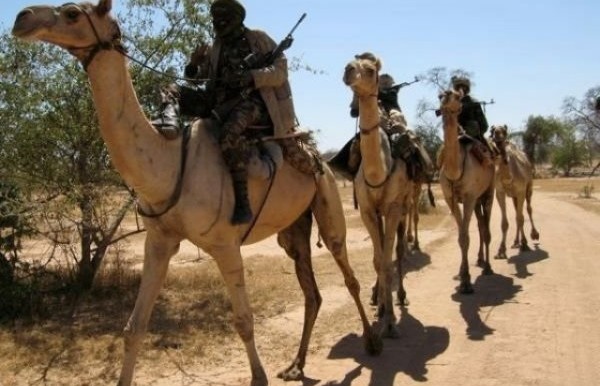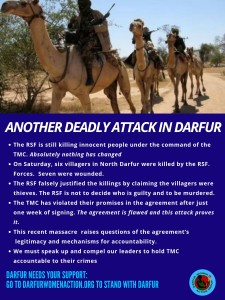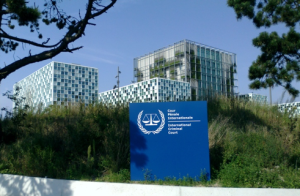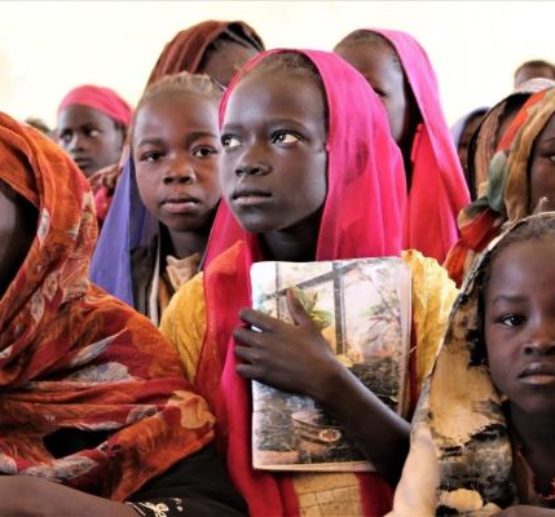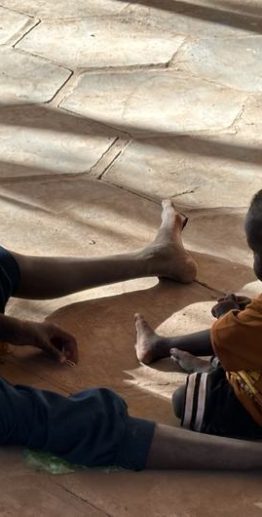Darfur Women Action Group (DWAG) is pleased to share with our dedicated supporters that the Council of Ministers unanimously passed a draft law for Sudan’s ratification of the Rome Statute of the International Criminal Court. While the draft law must now go to a vote before the Transitional Sovereignty Council, DWAG is encouraged that the interim government of Sudan has signaled its commitment to establish a sustainable foundation for justice and accountability not only for the crimes committed against the people of Darfur but across the Sudan. In a statement made via social media, Prime Minister Hamdok noted that “justice and accountability are the firm foundation of the new Sudan committed to the rule of law that we all seek to build.” Perpetrators of the genocide al-Bashir, Harun, and Hussein are now one step closer to facing the International Criminal Court and the people of Darfur are one step closer to receiving the justice they’ve waited so long for. Our tireless fight has just begun to see light. We have a long way to go and millions of steps more in our endeavor to see justice take its course in Sudan. Thank you for taking this daunting journey with us and for your continued support.
Archives: Statements
Another Deadly Attack on Civilians In Darfur
On July 17, a violent artillery attack on the Sortony camp in the suburb of Kebkabiya left 17 people dead, including seven women and five children. Nine people were hospitalized with severe injuries, including seven women and two children. Nearly 300 shops were looted and many houses were burnt to the ground in the attack. The residents of the camp sought refuge in the caves of Jebel Marra or were left without shelter in East Rokero. Darfur Women Action Group (DWAG) strongly condemns this barbaric attack and calls on the interim government and the state’s authority to take immediate and necessary measures to provide protection for the vulnerable and hold the responsible accountable.
The Coordination of Displaced Persons and Refugees in North Darfur reported that the telephone network was offline during the attack, leaving residents unable to contact those outside the camp or effectively count the victims. The coordination accused regular and unspecified peace-signed forces of perpetrating the attack that lasted for two days. Hundreds of protestors gathered in El Fasher, the capital of North Darfur, to decry the violence and march in solidarity with the displaced. DWAG amplifies their demands for the state government to bring those responsible to justice and protect Sortony as well as the other Internally Displaced Person (IDP) camps overrun by violence and insecurity. In wake of UNAMID withdrawal, the interim government of Sudan has promised peace and protection only to give false hope to the suffering people of Darfur and the international community. Civilians across Darfur have see neither peace nor protection
The most recent attack on Sortony is the latest in a litany of violent incidents within the displaced community in Darfur. The Kebkabiya locality currently hosts thousands of IDPs, the majority of them women and women-headed households. The Sortony camp was formed near a UNAMID base and after UNAMID withdrew on January 1, 2021, thousands of displaced people have been left vulnerable to attacks. A clash in El Sareif during April forced nearly 3,500 Darfuri from their homes, many of them relocating to the Sortony camp. The BBC reported yesterday on the surge in violence across Darfur and have implicated RSF and other armed forces in contributing to the violence, rather than actively seeking peace and disarming unregulated militias as they promised in the peace agreement. Insecurity devastates the intentionally unprotected displaced populations in Darfur – a pattern which culminates into an organized effort to destabilize camps in Darfur. These attacks are a clear sign of abhorrent negligence by the state government to provide security to vulnerable populations in Darfur. Furthermore, the implication of state-sanctioned forces in the slaughter is unquestionable evidence of the complicity of the interim government in continuing to enable the perpetration of the Darfur genocide.
DWAG urgently demands Prime Minister Hamdok and recently appointed wali (governor) of North Darfur, Nimir Mohamed Abdelrahman, to respond to the IDPs and protestors with immediate action. They must thoroughly investigate local and national forces and hold responsible parties accountable for the attack.
DWAG calls upon the Chargé d’Affaires Brian Shukan, Secretary of State Anthony Blinken, and the US government to press the government of Sudan and ensure that the interim government holds into account any political or military forces who endanger civilians’ lives and to bring them to justice.
- The US must not condone the unrelenting insecurity in Darfur nor deny the role of the interim government in their ongoing oppression of the people of Darfur.
- The US must make every support or normalization of relations with Sudan hinge on the condition of effective civilian protection, protection of human rights and accountability for the past and present crimes committed against innocent civilians in Darfur and across Sudan.
- DWAG further calls upon UNSC members to review UNITAMS’s mandate and authorize a civilian protection force to be deployed into Darfur and Sudan at large to provide adequate, uncompromised civilian protection throughout the interim period. With a civilian protection mandate, the UN has the ability to ensure that peace and stability can take root in Darfur, the two areas and across the Sudan.
DWAG urges our supporters to speak up for the people of Darfur and demand that their leaders take concerted action that will end the long suffering in Darfur. Please help us spread the word by sharing this statement to raise alarms and put pressure on both the interim government and international community. We must compel them to meet their obligation for civilians protection and attain a lasting end to genocide in Darfur.
A Shameful Silence from the Interim Government of Sudan as Violence Plagues West Darfur
Yesterday Radio Dabanga reported that more than 20 people died and dozens more were injured in the wake of tribal clashes in the Sirba locality of West Darfur. Fighting broke out on July 1 and has lasted for at least four days;news of death and violence continues to come in. The armed assailants have burned and destroyed more than five villages including Kafani, Karkar, Krekar, and Ammar Jadeed and displaced many people to the Azeri region. There has been no indication of local police or military intervening to protect civilians or to stop the violence — a dereliction of duty that Darfur Women Action Group condemns.
This report comes on the heels of a disputed Displacement Tracking Matrix Emergency Event Tracking update from the International Organization for Migration (IOM) from June 27 reporting that nearly 44,500 internally displaced persons (IDPs) in and around El Geneina returned to their location of origin in the past month. The update credits a more stable security situation for the return of the majority of returned IDPs. These numbers were gathered by a joint rapid verification exercise conducted by the IOM and the government-run Humanitarian Aid Commission (HAC) from May 27 to June 12. The Association of Displaced Persons and Refugees from Dar Masalit has expressed skepticism of the statistical criteria used, given that their independent committee did not find evidence of the reportedly 15,000 returned IDPs.
The death toll and the displacement from violent clashes over the weekend in Sirba reinforces the call of the association for a revaluation of IOM’s IDP estimates. The security of the people of West Darfur remains in a dire state. While the mobility tracking method used by IOM to arrive at this number can be used to provide estimates of displacement movements on a more frequent basis however it shouldn’t be used in measuring IDPs return as the UNHCR has advised this methodology shouldn’t be used for accuracy or verification purposes. The alleged underestimation of IDP numbers poses a troubling opportunity for the interim government to justify misleading interpretations of the security situation and general stability of affected West Darfur communities. Disputed numbers without verification by bodies independent of the interim government must not be readily accepted by the international community.
DWAG stands in Solidarity with the people of West Darfur and urgently calls on the interim government to immediately intervene to stop fighting and disarm militias in the Sirba locality and across Sudan. The UNAMID withdrawal last year came at the conclusion that local authorities could protect civilians against intercommunal violence and the genocidal attacks. However the surge of violent attacks in West Darfur since January has proven the opposite. The resounding indifference of local authorities to the slaughter of the people of Sirba has been the latest tragedy in a pattern of neglect. The interim government must not abandon their promise to protect the civilians of Darfur if peace is ever to be achieved.
DWAG is deeply troubled by the lack of attention by international and domestic media sources on the people of West Darfur. We strongly caution the international community against accepting the false assurances of the interim government at face value. Increasing international acceptance of the interim government diverts attention from the suffering of the people of Darfur. The genocide has not ceased. The interim government is inextricably intertwined with actors of the previous administration intent on the continued persecution of the indigenoue Darfuris who were long targeted during the former regime’s rule. DWAG calls upon the Biden administration and the US Secretary of State Anthony Blinken to hold the interim government accountable for devastating insecurity across Darfur.
We call on our supporters to speak up and ensure that we must continue to shine light on these atrocities and hold our leaders accountable for their silence in the face of these ongoing tragic situation in Darfur. WE must keep all eyes on Darfur and hold the interim government responsible for failure to protect civilians.
DWAG Extends Gratitude to ICC Chief Prosecutor Fatou Bensouda for Actively Pursuing Justice
As her historic tenure comes to a close, Darfur Women Action Group (DWAG) would like to extend its gratitude to International Criminal Court (ICC) Chief Prosecutor Fatou Bensouda for her tireless and comprehensive work in the pursuit of justice. We are particularly grateful to Ms. Bensouda for advancing investigations of sexual and gender-based crimes to secure justice for survivors and for her dedicated work on the Darfur proceedings.
Prosecutor Bensouda assumed office as ICC Chief Prosecutor in June 2012. From the beginning of her nine-year term, Prosecutor Bensouda committed the ICC Office of the Prosecutor (OTP) to enhancing the effectiveness of the prosecution of sexual and gender-based crimes. In June 2014, Prosecutor Bensouda launched the landmark Policy on Sexual and Gender-Based Crimes, in which she expanded the ability of the Office to obtain the evidence required to secure convictions for sexual and gender-based crimes. As a result, the OTP adopted a gender perspective analysis in order to fully understand the role of gender and gendered experiences of individuals and communities involved in a particular crime scenario. The policy also was a significant contribution to international criminal law as it included an extensive list of sexual and gender-based crimes to the Rome Statute, the treaty that established the Court. The development of this policy has allowed survivors of sexual and gender-based crimes to seek justice when their domestic options are limited, a mechanism that is essential to survivors around the world, including in Darfur.
The United Nations Security Council (UNSC) referred the Darfur situation to the ICC in March 2005, which resulted in the ICC issuing three indictments, but due to lack of cooperation, limited progress was made. Despite the numerous challenges that Prosecutor Bensouda faced and
many actors around the world forgetting about Darfur, she showed resilience and stood in solidarity with its people by ensuring the Court remained committed to ensuring that justice would prevail for survivors of the atrocities in Darfur. Prosecutor Bensouda continued to appeal to the UNSC for help with the investigations in Darfur and called upon the Assembly of State Parties to allocate sufficient resources for Darfur investigations.
Prosecutor Bensouda made her first visit to Khartoum in October 2020. During this visit, Prosecutor Bensouda emphasized the necessity of a Memorandum of Understanding (MoU) between the OTP and the interim government of Sudan. In February 2021, the interim government signed the MoU, allowing the OTP to deploy an investigation team to collect evidence that could lead to the prosecution of Ali Muhammad Ali Abd-Al-Rahman known as Ali Kushayb. DWAG once again commends Prosecutor Bensouda on her commitment to fighting alongside the people of Darfur, which culminated in the Ali Kushayb confirmation of charges hearing in May.
During the last days of her term, Prosecutor Bensouda visited Sudan, traveling across the country to meet with the interim government and to call for the genocide perpetrators to be transferred to ICC custody to be tried. She also traveled to Darfur and met with internally displaced persons (IDPs) and victims of the genocide. Upon her arrival at Kalma camp, she was met with cheering and chanting in support of the Court and for the transfer and prosecution of all Sudanese ICC indictees. In her final statement to the UNSC on the Court’s progress on the situation in Darfur, Prosecutor Bensouda said her trip was “a strong reminder that we should
stay focused on achieving justice for the victims and finding lasting peace for the people of Darfur.” DWAG strongly supports Prosecutor Bensouda’s remarks to ensure full accountability of the perpetrators and restore justice for the people of Darfur.
DWAG expresses our team’s sincere gratitude for Prosecutor Bensouda’s unrelenting work for the people of Darfur and victims of sexual violence in her nine year term. We would also like to thank the Prosecutor for her continued collaboration with our organization, actions that prove her commitment to lifting up the voices of those who suffer through the world’s worst crimes. DWAG urges her successor, Mr. Karim Khan, to continue her efforts to hold the perpetrators of the Darfur genocide accountable by securing direct and full participation of the victims and
continuing to advocate for the transfer of all of the indicted officials from the Bashir regime. We remain confident, however, that Prosecutor Bensouda’s legacy and impact on the international mechanisms for justice will live on with the Court far beyond her tenure.
16 Days of Activism Campaign
16 DAYS OF ACTIVISM TO END VIOLENCE AGAINST WOMEN
DEMAND JUSTICE FOR CRIMES COMMITTED AGAINST WOMEN IN DARFUR
From November 25th to December 10th (International Human Rights Day), 2019, Darfur Women Action Group (DWAG) will launch a campaign to mark the 16 Days of Activism Against Gender-Based Violence Campaign – a worldwide initiative to shed light on violence against women and girls.
During these 16 days, DWAG invites you to join us in demanding justice for the victims of violence as well as accountability for perpetrators of crimes committed against women in Darfur and across Sudan. We will use this opportunity to bring attention to the long-standing genocidal attacks against women in Darfur and to recognize the courage, resilience, and resolve of these women, who continue to rise up despite their unspeakable suffering. Darfuri women have endured unimaginable pain over the last 16 years and, yet, have demonstrated outstanding leadership as they stand up for themselves and their people who continue to live in makeshift camps for 17 years today.
To participate in our campaign, share our LEARN and LISTEN, messages on social media to bring awareness about this issue and then TAKE ACTION to help the women in Darfur.
THE SITUATION IN DARFUR
Since 2003, violent attacks, rape, arrests, and torture have devastated the lives of the innocent civilians of Darfur. By 2006, over 300,000 civilians had been killed, 4 million had been forced from their homes, and over 5000 villages had been completely destroyed. To this day, government forces continue to use rape as a weapon of war with total impunity and as a method of terrorizing women and girls.
Despite the recent developments in Sudan, 3 million people continue to be without their homes with the overwhelming majority of the internal camps’ population being women and children. Nothing has improved for them, as their plight has not been a priority for Sudan’s interim government
As a result of the impunity for crimes committed in Darfur, the government of Sudan has extended its use of rape to other regions. On June 3, 2019, when Rapid Support forces stormed the protesters during a sit-in, killing over 150 people, an estimated 70 women were raped or sexually assaulted – and the perpetrators have yet to face any consequences.
Sudanese President al-Bashir has been the person chiefly responsible for these horrific crimes and is wanted by the International Criminal Court (ICC) on three counts of genocide, two counts of war crimes and five counts of crimes against humanity. President al-Bashir, although recently ousted from the Presidency, his military apparatus still actively pursuing his genocidal policy in Darfur and other regions of Sudan despite these warrants and continues to victimize women with impunity as the international community fails to bring him to trial.
World leaders have faced the situation in Darfur in silence.
Because Darfur now lacks the attention of the world, many think the genocide is over. Reports from Darfur confirmed that during this year alone there have been over 157 violent incidents against civilians and the Sudanese Government has destroyed 60+ villages. Over 3 million people who were displaced are still unable to return home in fear for their lives. Many Darfuri now live in internally displaced and refugee camps in Sudan and Chad – where the overwhelming majority (about 80-95%) are women and children. At the same time, rape continues to be a systematic tactic and deliberate policy of the regime and is used as a weapon of war and means of intimidation, even after the ousting al-Bashir.
WE NEED YOU, YOUR VOICE, AND YOUR SUPPORT
We need to mobilize the masses to shed light on this dire situation and take further action towards tangible change. It only takes one person for positive change to begin. DWAG will remain vigilant and refuse to condone the silence of the international community. We say NO to the silent conspiracy on Darfur and YES to empowering survivors and ordinary citizens to speak up.
JOIN US IN OUR #16DAYSCAMPAIGN #JUSTICEFORDARFUR #JUSTICEFORWOMEN
LEARN. Make an effort to understand the situation in Darfur, the ongoing genocide, and how it affects women and girls. We will be sharing stories and reports and provide you with more opportunities to learn.
LISTEN. Hear and share the stories of Darfuri women, their suffering, and outstanding resilience.
TAKE ACTION. Join us in taking at least once action that will help end violence against women in Darfur:
- Use the hashtag #JusticeForDarfur to send a message to the member states of the ICC and call their attention to the ongoing plight and demand that they bring al-Bashir and other Sudanese suspects to trial.
- Raise awareness by sharing our campaign content on social media using the hashtag #16DaysCampaign #JusticeForDarfur.
Donate to DWAG to support a rehabilitation center for women survivors of sexual violence in Darfur.
Share our campaign with 5-10 people in your network and help us spread the word
- Join our Rapid Response Network, a group of community members who are on standby to help us with campaigns and petitions.
Send a solidarity message that we can share with our supporters and the women in Darfur: campaign@darfurwomenaction.org
Thank you for your continued support
Truly yours,
Niemat Ahmadi, President
Another Deadly Attack in Darfur
While the world’s attention is consumed by the recently signed flawed agreement, reports of another massacre by Janjaweed (Rapid Support Forces or RSF) are coming out of Darfur.
On Saturday, July 20, six villagers were brutally shot dead. Amongst them were several children, and seven others were seriously wounded. The perpetrators still faced no consequences. The paramilitary group responsible for the killings were seen wearing Rapid Support Force uniforms.
The RSF slaughtered these six after accusing them wrongfully of theft. The RSF is not to decide who is guilty and who is not. The power-sharing agreement that was recently signed claimed it would prevent these types of senseless killings. The RSF has continued its barbaric violence under direction of the military junta, the TMC, who have just been legitimized by the agreement.
Saturday’s incident is not isolated. It’s a part of the systematic and deliberate violence that has continued to be carried out against indiginous Africans in Darfur for the past sixteen years. Impunity sanctions the attacks that continue today.
This sad incident came a week after the signing of a power-sharing agreement which proves that the agreement will not bring any change on the ground in Darfur. This validates a fear that many Darfuri felt after the signing of the agreement: it left them behind. The agreement is flawed and this attack proves it.
This recent attack also raises questions of legitimacy for the agreement. Specifically, its lack of an accountability mechanism. The negotiators of The Alliance for Freedom and Change Forces have done nothing other than giving more legitimacy to the military junta to continue carrying out their crimes.
It is extremely dismaying to see the international community failing in its responsibility to hold the perpetrators accountable. We therefore must speak up and compel our leaders to take effective measures to reexamine the agreement and bring to the accountability issue into question.
We call on the United States government, African Union and the member states of the United Nations Security Council to fulfill their obligation and hold the Sudanese military juntas accountable for their crimes.
U.S. and the UNSC must impose targeted sanctions, a travel ban and freeze the assets of the military leaders in charge of Rapid Support Forces. Justice for the victims and accountability for perpetrators is the only way to end the crisis in Darfur and Sudan at large .
Join with Darfur Women Action Group in our Stand With Darfur campaign to demand justice for those ravaged by war and genocide. Without justice, there will never be peace.
Don’t Let Bashir Get Away With Genocide
Nine years ago today…
The International Criminal Court (ICC) issued a second arrest warrant for President Omar al-Bashir of Sudan. He is wanted on 3 counts of genocide, 5 counts of crimes against humanity, and 2 counts of war crimes. Bashir is the first individual to be accused of genocide under the ICC jurisdiction and was the first head of state wanted by the ICC. He started his attack in Darfur in 2002. It still isn’t over, and Bashir still hasn’t faced trial for his crimes.
For more than 17 years, the Sudanese Government’s military forces and their allied militia (the Janjaweed) have carried out systematic attacks against the Darfuri people based on their ethnicity. They have bombed villages, abducted civilians, looted private property, and used rape as a weapon of war against women and girls. As a result, over 4 million Darfuris have been affected and over 3 million have been forced to leave their villages and settle in displacement camps located in Sudan and Chad. These people remain in camps with limited access to humanitarian assistance, education, health care and food. Some try to escape through Libya and onward to Europe only to be kidnapped, tortured and ransomed – often by the Rapid Support Forces (RSF).
In 2016 the Government of Sudan used chemical weapons in Jabel Marra region of Darfur. According to an Amnesty International report, at least 32 chemical bombs were dropped on villages inhabited by civilians. As a result, 171 villages were destroyed and between 200 and 250 civilians died of exposure to these agents, most of them children. Many others developed life-threatening symptoms, including severe gastrointestinal conditions involving bloody vomiting and diarrhea, blistering and rashes on the skin, loss of vision, and respiratory problems.
To date the situation remains urgent, as the regime in Khartoum shows no signs of stopping their unrelenting attacks. In the last year alone, at least 45 villages were documented burned to the ground. Last month, 17 were killed when the RSF torched 100 homes. From December 2017 through January 2019, the United Nations-African Union joint peacekeeping mission for Darfur, UNAMID, reported 192 victims of sexual and gender-based violence. The Sudanese Government’s targeting of Darfuri students studying at the University of Khartoum was highlighted when over 1000 students were forced to abandon university as a result of the mass and systematic abuse.
The recent massacre in Sudan on June 3rd underscores how much impunity for the crimes committed in Darfur could cost the people of Sudan. When Bashir committed genocide in Darfur he didn’t act alone. He used the RSF, then known as the Janjaweed, who were led by the current leaders: al-Burhan and Dagalo (Hemeti). Failing to hold al-Bashir and the other ICC indicted criminals accountable sends a strong message to the current military leaders in Sudan: that if they can maintain their grip on power, no matter how many people they kill, they will get away with without consequences.
Not only does the Government of Sudan allow for the direct killing of civilians, it uses starvation and the denial of medical treatment as weapons of war to kill more people. At the beginning of 2019, 5.7 million were in need of humanitarian aid. Between 2012-2018, there have been reports of cholera outbreaks. The government, however, prohibits medical institution from declaring it as such. Instead, “watery diarrhea” is reported. The symptoms of this “watery diarrhea” seem to be consistent with the symptoms of cholera. The UN has yet to declare an outbreak of cholera, instead reporting the government approved “watery diarrhea”. This is just another example of the government causing unnecessary suffering in Sudan.
We call on the international community, particularly the member states of the United Nations Security Council (UNSC), to fulfill their obligation to hold al-Bashir accountable for his crimes instead of rewarding him with freedom.
We are extremely dismayed and disappointed that during the last 17 years justice has been denied to the people of Darfur. We are thankful that the ICC continues to investigate and bring charges against those involved in Darfur. The problem is that member states of the UNSC and the States Parties to the Rome Statute ignore their obligation to arrest Bashir, betraying the people of Darfur. While the ICC has no police to arrest the suspect, the Rome Statute obligates the States Parties to collaborate with the Court and uphold their decisions. States Parties should strive to provide the support needed to the court to bring criminals to face justice. The inaction by the States Parties and UNSC members allows President al-Bashir to escape trial and promotes impunity.
Despite being a wanted war criminal, some states attempted to improve relations with Sudan. In 2016, the European Union initiated a collaboration with Sudan in an attempt to curb the number of African refugees entering Europe. The EU paid the Sudanese Government which then paid the RSF to continue their genocide attacks in Darfur. What’s more, the RSF engages in human trafficking across the borders with Chad and Libya under the guise of supporting the migrant agreement. In October of 2017, the United States lifted some sanctions on Sudan and was working toward normalization with Sudan despite Bashir being indicted by the ICC.
Instead of holding al Bashir and his co-conspirators accountable, the international community rewards them with freedom. Allowing criminals to go unpunished undermines the pursuit of justice for victims and accountability for perpetrators of the most heinous crimes. For years individuals argued against arresting Bashir, a head of state. Bashir is no longer a head of state and there has never been a better time to pursue justice for the long awaiting victims of genocide in Darfur.
Nine years of impunity is too long for the suffering victims in Darfur.
President al-Bashir has escaped accountability for his crimes for too long. Justice delayed is justice denied, and until the international community faces the reality of what is happening in Darfur, millions will continue to suffer at the hands of this man and his loyalists who are currently in power. Impunity for these serious crimes is a threat to universal human rights, which our leaders continue to preach but fail to uphold. In the face of genocide, the world declared Never Again. Why then, do we allow such acts to continue in Sudan again and again?
We believe that pursuing justice is not only necessary to punish Bashir and others for their past crimes, but to establish a basis of accountability to prevent future crimes. We at DWAG are committed and will continue to speak louder. We will make our voice heard in the fight to end genocide. We will continue to demand accountability as our moral mandate – will you join us?
To add your voice, join our campaign.
Sincerely,
Niemat Ahmadi
President, Darfur Women Action Group
